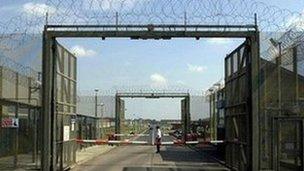Maghaberry Prison review call follows prisoner attempted suicide
- Published

The attempted suicide happened at Maghaberry Prison
The prisoner ombudsman has called for a review into the way vulnerable prisoners are treated following the attempted suicide of a man at Maghaberry.
He now has permanent brain damage and physical injuries.
A report says although the prisoner had a history of self harm, he was confined to his cell for long periods with very limited human contact.
The ombudsman, Pauline McCabe, said 44 recommendations had been made.
The investigation found that the prisoner, 'Mr C', had a number of background risk factors that indicated an increased risk of suicide in custody.
This included a past psychiatric history, previous alcohol abuse, the recent bereavement of his partner, and distress caused by his two young children being in care.
During his time in custody, Mr C had episodes of self-harming, suicidal ideas, and had also become increasingly anxious about his personal safety.
Mrs McCabe said the investigation had found supporting prisoner at risk protocols were, in general, implemented to a higher standard than had been observed in other investigations.
However, she added: "Nevertheless, it is the case that, despite this prisoner's history and significant number of self-harm risk factors while in custody, he was confined to cell for long periods with very limited human contact.
"This poses fundamental questions about the effectiveness of the prison service and the trust's approach to managing vulnerable prisoners.

Prisoner Ombudsman said the case had highlighted a number of areas of concern
"In particular, this investigation has raised concerns about the extent to which current procedures for dealing with vulnerable prisoners, even where conscientiously applied, actually deliver an appropriate level of care.
"It should never be the case that a 'box ticking' approach undermines the ability of individual officers and healthcare staff to apply common sense and compassion to prisoner care and, as such, there is a clear need for a further review of how vulnerable prisoners are dealt with."
Mrs McCabe said she had always considered the prison service's criteria for triggering a near death investigation to be unduly restrictive.
"I am therefore pleased that the director general of the prison service has now given a commitment to review this," she added.
Prison service director general Sue McAllister said: "The prison service accepts that while he was the subject of 15-minute observations, 29 minutes had elapsed from the time of 'Mr C's' last observation, to the time he was found in his cell in a near death state.
"The ombudsman notes that prior to this final check, all other observation checks on the prisoner had been carried out consistently in line with his care plan.
"There are important issues raised by the ombudsman in relation to the overall approach to caring for vulnerable prisoners and I will pay close attention to this in my overall consideration of the report in collaboration with the South Eastern Health and Social Care Trust."
- Published17 December 2012
- Published15 October 2012